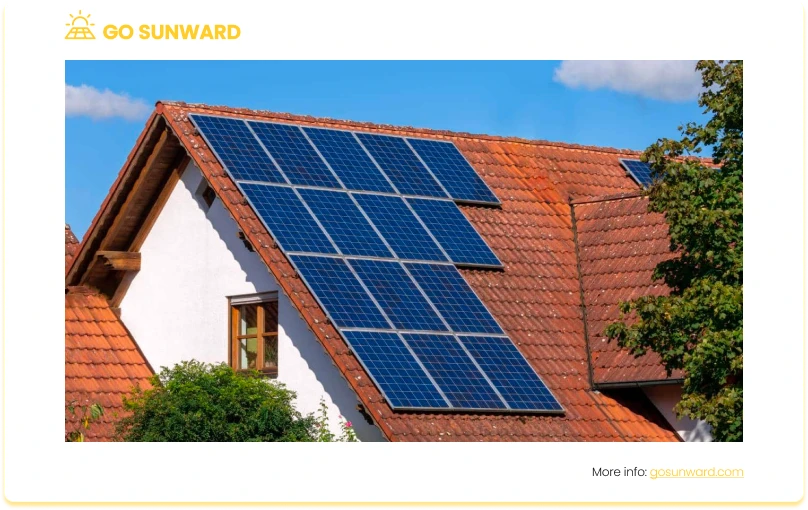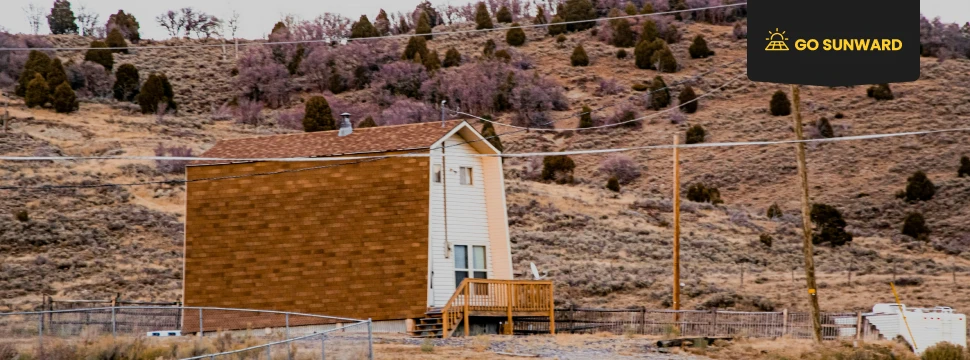Is My House Good For Solar? Check If Solar Will Work
Solar energy is gaining widespread recognition as a sustainable and economically viable choice for homeowners seeking to reduce their carbon footprint and lower electricity bills. However, before embarking on the solar journey, it is crucial to assess whether your house is a suitable candidate for solar panels. Understanding the factors that determine the feasibility of solar energy in your specific circumstances can help you make an informed decision.
In this article, we will explore the essential considerations enabling you to determine if solar energy is a viable and beneficial choice for your home. Whether you’re motivated by environmental concerns, financial savings, or energy independence, these key factors will guide you in evaluating the compatibility of your house with solar technology.
You can also use our free solar savings estimator to see exactly how many solar panels your roof could take, and how much money that would save you! If you’d prefer a more in depth guide though, then keep reading…
Is My House Good For Solar? Assessing Your Roof
When considering solar panel installation, the first critical step is to check your roof thoroughly. The condition and characteristics of your roof can significantly impact the efficiency and effectiveness of your solar energy system.

Roof Orientation and Angle
The orientation and angle of your roof are pivotal in maximizing solar panel efficiency. In general, south-facing roofs in the northern hemisphere and north-facing roofs in the southern hemisphere receive the most sunlight throughout the day. These orientations are ideal for solar panel installations, as they optimise sunlight.
Shading can significantly affect the performance of solar panels. Even partial shading can lead to a reduction in energy production, as it disrupts the direction and flow of electricity within the solar array. Analyze your roof’s surroundings throughout the day to identify potential shading sources.
Roof Condition & Structural Integrity
Before installing solar panels, it’s crucial to assess your roof’s condition and structural integrity. Solar panels have a long lifespan, typically around 25-30 years or more, so your roof should be in good shape to support them.
A sturdy and well-maintained roof ensures the safety and longevity of your solar panel system. An experienced solar installer can help assess your roof’s readiness for solar installation and recommend any necessary repairs or reinforcements.
Is My House Good For Solar? Solar Potential in Your Location
Understanding the solar potential in your specific geographic location is fundamental when considering solar energy. Your location is crucial in determining how much solar energy your system can generate and, consequently, the economic viability of solar panel installation.
Geographic Location
Your geographic location significantly influences the amount of sunlight your solar panels can capture. Solar energy production varies depending on your latitude, longitude, and regional climate patterns.
Locations closer to the equator typically receive more direct sunlight throughout the year, resulting in higher solar energy production. Conversely, areas at higher latitudes may experience reduced sunlight during certain seasons.
Local Climate Conditions
Local climate conditions, including sunlight hours and seasonal variations, directly impact your solar energy system’s performance. Understanding these factors helps you set realistic expectations for energy production.
Solar panels are most efficient under clear, sunny skies. Cloudy or rainy weather can temporarily reduce energy production. Seasonal variations, such as shorter days in winter, should also be considered when estimating energy generation.

Solar Potential Calculators
Fortunately, numerous online tools and resources are available to help homeowners estimate their solar potential accurately to see if their house is good for solar. One example of an online solar potential calculator is the “PVWatts Calculator” provided by the U.S. Department of Energy’s National Renewable Energy Laboratory (NREL). This tool allows users to estimate the electricity production of a grid-connected solar energy system based on their location, the size of the system, and other factors.
By leveraging these online tools and resources, homeowners can gain a clearer understanding of their property’s solar potential. This type of information is invaluable when making informed decisions about the size of your solar installation, expected energy savings, and the overall financial benefits of transitioning to solar energy.
Is My House Good For Solar? Energy Consumption Analysis
your home for solar power. The fundamental query revolves around potential savings. In regions where electricity costs are notably low, the prospect of solar savings may be less pronounced.
Yet, for most homeowners burdened by their monthly electricity bills, solar emerges as a compelling solution. A general guideline is that solar becomes economically advantageous for those whose monthly electricity expenses are at least $75.
Assessing Household Energy Consumption
The first step in your solar journey is to understand how much energy your household consumes on a daily and monthly basis. A precise understanding of your energy consumption allows you to determine the size of the solar installation required to meet your needs. It also serves as a baseline for measuring the impact of your solar system on your utility bills.
Role of Energy-Efficient Upgrades and Lifestyle Changes
Optimizing solar benefits involves not only generating clean energy but also reducing unnecessary energy consumption. Energy-efficient upgrades and lifestyle changes can significantly enhance the effectiveness of your solar energy system.
Reducing energy waste through upgrades, such as LED lighting, insulation improvements, and efficient appliances, ensures that you get the most out of your solar investment. Lifestyle changes, such as adjusting thermostat settings and practicing energy conservation, can further maximize savings. Click here to learn more about the energy savings you can make at home.
Calculating Electricity Needs and Solar Savings
To determine the appropriate size of your solar energy system and estimate potential savings, follow these steps:
- Step 1: Gather Your Utility Bills: Collect your electricity bills from the past year to identify your average monthly consumption.
- Step 2: Calculate Daily Usage: Divide your monthly consumption by 30 to determine your daily electricity usage.
- Step 3: Account for Solar Energy Production: Estimate the daily energy production of your prospective solar installation. You can use online calculators or consult with solar professionals for this purpose.
- Step 4: Assess Potential Savings: Compare your daily energy usage with the daily energy production of your solar system. This calculation will give you an estimate of how much of your electricity needs can be met by solar power.
- Step 5: Explore Solar Financing: Consider various financing options, including solar loans, leases, or power purchase agreements (PPAs), to determine the financial feasibility of your solar project.
By carefully assessing your energy consumption and setting realistic goals, you can tailor your solar installation to your specific needs. Implementing energy-efficient measures and lifestyle changes further ensures that you maximize the savings and environmental benefits of your solar energy system.
Next Steps: Consult With Solar Professionals
When considering if solar is good for your house, it is a smart idea to connect with professionals, gathering advice from experienced solar experts and installers. Consulting with professionals ensures that you make well-informed decisions and maximize the benefits of your solar investment.
The Importance of Professional Advice
Solar experts bring specialized knowledge about solar technology, system design, and installation best practices, ensuring the safe and efficient operation of your solar energy system. They can also evaluate your unique energy needs, property characteristics, and local regulations to customize a solar solution that meets your specific requirements.
A solar site assessment, part of their expertise, involves an on-site inspection to evaluate your property’s suitability for solar panels. The assessment results inform the optimal design and placement of solar panels to maximize energy production, ensuring the most efficient use of your solar investment.
Choosing a Reputable Solar Installation Company
When it comes to choosing a reputable solar installation company, homeowners should start by conducting thorough research on local solar companies. Reading reviews on Google and seeking recommendations from friends or neighbors who have already installed solar panels can provide valuable insights.
Ensure that the chosen company possesses all the necessary licenses and certifications required for solar installations in your area. This not only demonstrates their adherence to local regulations but also their commitment to industry standards.
Next, reach out to multiple companies for detailed quotes. By comparing their pricing, warranties, and financing options, you can gauge their transparency and competitiveness, which indicates a trustworthy company.
Consider the company’s track record in terms of customer service and responsiveness. Effective communication and reliable support throughout the installation process are crucial for a seamless experience.
Lastly, take a close look at the warranties offered for both equipment and workmanship. Reputable companies typically provide comprehensive warranties to ensure the protection of your solar investment.
Read our comprehensive guide on what to look for when choosing a solar installer.
Is DIY An Option?
When considering a solar installation, some homeowners may wonder if a do-it-yourself (DIY) approach is feasible. While DIY solar kits are available and can be a cost-effective choice, they come with certain caveats.
DIY solar projects require a good level of technical knowledge, including electrical and roofing skills. Additionally, you must be comfortable with local permitting and building codes, as well as handling potential paperwork with your utility company.
Before opting for a DIY solar installation, carefully assess your expertise and willingness to take on a significant DIY project. If you’re uncertain about any aspect or lack the necessary skills, it’s advisable to consult with professional solar installers who can ensure a safe and compliant solar panel setup for your home. We have numerous articles to help you if undertaking a DIY solar project.
Conclusion
In the quest for a greener and more cost-effective future, the question of whether your house is suitable for solar energy is a crucial one. As we’ve explored in this article, assessing your home’s potential for solar power involves evaluating your roof, considering your location, analyzing energy consumption, and consulting with professionals.
So, is your house good for solar? With careful consideration and the right resources, the answer is often a resounding “yes.” Embrace the potential of solar energy and take that pivotal step toward a more sustainable and cost-effective future for your home and our planet. Your commitment to solar power is not just an investment in your property; it’s an investment in a brighter, cleaner tomorrow.



